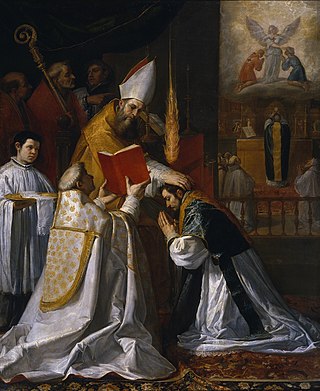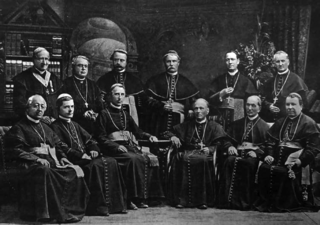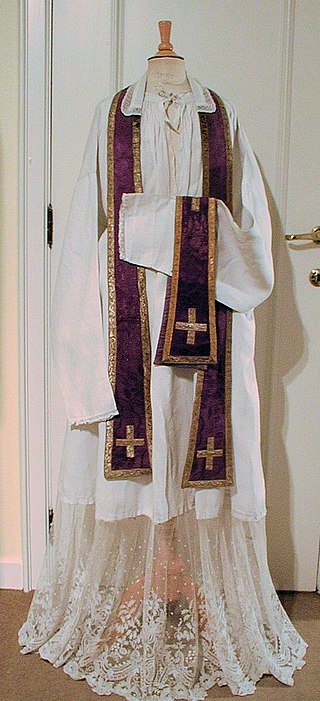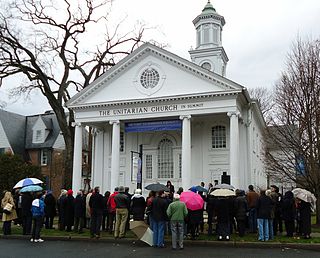
In certain Christian denominations, holy orders are the ordained ministries of bishop, priest (presbyter), and deacon, and the sacrament or rite by which candidates are ordained to those orders. Churches recognizing these orders include the Catholic Church, the Eastern Orthodox, Oriental Orthodox, Anglican, Assyrian, Old Catholic, Independent Catholic and some Lutheran churches. Except for Lutherans and some Anglicans, these churches regard ordination as a sacrament.

Unitarian Universalism is a liberal religious movement characterized by a "free and responsible search for truth and meaning". Unitarian Universalists assert no creed, but instead are unified by their shared search for spiritual growth. Unitarian Universalists do not have an official, unified corpus of sacred texts but rather draw inspiration and guidance from the six sources: personal experience, prophetic utterances, world religions, Jewish and Christian teachings, humanist teachings, and spiritual teachings. Unitarian Universalist congregations include many atheists, agnostics, deists, and theists; there are churches, fellowships, congregations, and societies around the world.

Clergy are formal leaders within established religions. Their roles and functions vary in different religious traditions, but usually involve presiding over specific rituals and teaching their religion's doctrines and practices. Some of the terms used for individual clergy are clergyman, clergywoman, clergyperson, churchman, cleric, ecclesiastic, and vicegerent while clerk in holy orders has a long history but is rarely used.
A pastor is the leader of a Christian congregation who also gives advice and counsel to people from the community or congregation. In Lutheranism, Catholicism, Eastern Orthodoxy, Oriental Orthodoxy and Anglicanism, pastors are always ordained. In Methodism, pastors may be either licensed or ordained.

Ordination is the process by which individuals are consecrated, that is, set apart and elevated from the laity class to the clergy, who are thus then authorized to perform various religious rites and ceremonies. The process and ceremonies of ordination vary by religion and denomination. One who is in preparation for, or who is undergoing the process of ordination is sometimes called an ordinand. The liturgy used at an ordination is commonly found in a book known as an Ordinal which provides the ordo for celebrations.
In religious organizations, the laity consists of all members who are not part of the clergy, usually including any non-ordained members of religious orders, e.g. a nun or a lay brother. In both religious and wider secular usage, a layperson is a person who is not qualified in a given profession or does not have specific knowledge of a certain subject. The phrase "layman's terms" is used to refer to plain language that is understandable to the everyday person, as opposed to specialised terminology understood only by a professional.

The stole is a liturgical vestment of various Christian denominations, which symbolizes priestly authority; in Protestant denominations which do not have priests but use stoles as a liturgical vestment, however, it symbolizes being a member of the ordained. It consists of a band of colored cloth, usually of silk, about seven and a half to nine feet long and three to four inches wide, whose ends may be straight or may broaden out in the shape of a spade or bell. The center of the stole is worn around the back of the neck and the two ends hang down parallel to each other in front, either attached to each other or hanging loose. The stole is almost always decorated in some way, usually with two crosses, or sometimes another significant religious design. It is often decorated with contrasting galloons and fringe is usually applied to the ends of the stole following Numbers 15:38–39. A piece of white linen or lace may be stitched onto the back of the collar as a sweat guard, which can be replaced more cheaply than the stole itself.
A Protestant or Evangelical youth ministry is a Christian ministry aimed towards young people through the lens of Protestant of Evangelical traditions. Focuses may include the instruction of youths in what it means to be a Christian, how to mature as a Christian, and how to evangelize others through apologetics. Youth ministries may vary widely depending on their denomination, size, liberal or conservative outlook and geographic location.

A variety of religious emblems programs are used by the Boy Scouts of America (BSA) to encourage youth to learn about their faith and to recognize adults who provide significant service to youth in a religious environment. These religious programs are created, administered and awarded by the various religious groups, not the BSA, but each program must be recognized by the BSA.

In Christianity, a minister is a person authorised by a church or other religious organization to perform functions such as teaching of beliefs; leading services such as weddings, baptisms or funerals; or otherwise providing spiritual guidance to the community. The term is taken from Latin minister. In some church traditions the term is usually used for people who have been ordained, but in other traditions it can also be used for non-ordained.
In Christianity, ministry is an activity carried out by Christians to express or spread their faith, the prototype being the Great Commission. The Encyclopedia of Christianity defines it as "carrying forth Christ's mission in the world", indicating that it is "conferred on each Christian in baptism." It is performed by most Christians. This is distinguished from the "office of minister", to which specific individuals who feel a certain vocation. It can signify this activity as a whole, or specific activities, or organizations within a church dedicated to specific activities. Some ministries are identified formally as such, and some are not; some ministry is directed towards members of the church, and some towards non-members. See also Apostolates.

Liberal Religious Youth (LRY) was an autonomous, North American youth organization affiliated with the Unitarian Universalist Association (UUA). LRY was unique as a church youth group in that it was governed solely by its members, who were generally between the ages of fourteen and nineteen years old, with adults serving only in an advisory capacity. Though partial funding and office space were provided by the UUA, primary funding was through an independent endowment, the investment of which was controlled by the LRY board of directors.
Religious emblems programs also called religious recognition programs are awards set up by some religious organizations for members of various youth organizations.

The Young People's Christian Union (Y.P.C.U.), organized in 1889, was a Universalist youth group created to develop the spiritual life of young people and advance the work of the Universalist church. Soon after it was founded, the Y.P.C.U. focused its attention on missionary work. It was instrumental in the founding of new southern churches and the creation of a Post Office Mission for the distribution of religious literature.

Unitarian Universalism, as practiced by the Unitarian Universalist Association (UUA), and the Canadian Unitarian Council (CUC), is a non-Creedal and Liberal theological tradition and an LGBTQ affirming denomination.
While the Constitution of Vietnam officially provides for freedom of religion, in practice the government imposes a range of legislative measures restricting religious practice. All religious groups must register and seek approval from the government. The government requires all Buddhist monks to be approved by and work under the officially recognized Buddhist organization, the Vietnam Buddhist Sangha (VBS). The number of Buddhist student monks is controlled and limited by the Committee on Religious Affairs. According to a 2020 report by Human Rights Watch, prohibited religious activities are those deemed to be contrary to arbitrary notions of the "national interest", "public order", or "national unity". Unrecognized religious groups, including Cao Đài, Hòa Hảo, and some Christian, and Buddhist groups face "constant surveillance and harassment". Some religious groups may be subject to "public criticism, forced renunciation of faith, detention, interrogation, torture, and imprisonment." Laws continue to be applied unevenly however, with some local government areas taking a more relaxed and tolerant approach than others.
Young Religious Unitarian Universalists (YRUU) is a term used within the Unitarian Universalist Association (UUA) in the United States and formerly the Canadian Unitarian Council. YRUU was an organization at the continental level primarily run by youth, ranging in age from 14 to 20, with mentoring adult partners. The continental organization of YRUU ended in 2008, but the term is still used by certain active youth groups and conferences at the congregational and district levels.

All Souls Unitarian Church is a Unitarian Universalist (UU) church in Tulsa, Oklahoma. It is one of the largest UU congregations in the world.
The clergy of the United Church of Canada are called "ministers". There are two "streams", ordered ministry and lay ministry. Ordered ministry includes ordained ministers and diaconal ministers. Lay ministry refers to licensed lay worship leaders (LLWL), designated lay ministers (DLM), sacraments elders, and congregational designated ministers (CDM). There are no restrictions on gender, sexual orientation, age, or marital status for any branches of ministry.

Northwest Unitarian Universalist Congregation (Northwest) was organized in 1969. The organization of Northwest was the result of action taken by the Unitarian Universalist Congregation of Atlanta (UUCA) to establish a new congregation in the northwest suburbs of Atlanta.











